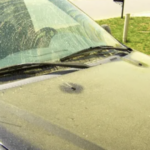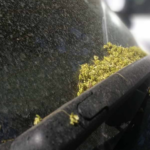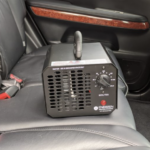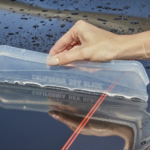The Impact of Orlando’s Pollen Season on Cars & How to Keep It Clean
Why Orlando’s Pollen Season is a Problem for Car Owners
Every spring, Orlando residents deal with a familiar sight—thick layers of yellow-green pollen coating their vehicles. While it may seem like a harmless inconvenience, pollen can cause long-term damage to your car’s exterior and interior if not properly managed.
The combination of high humidity, frequent rain, and warm temperatures in Florida makes pollen especially difficult to remove. When left on the surface, it bonds to the paint, creating a gritty layer that can cause scratches during cleaning. If it finds its way into your vehicle’s air vents and upholstery, it can lead to persistent odors and allergies.
Areas with heavy tree coverage, such as Winter Park, Windermere, and Lake Mary, tend to experience the worst pollen buildup. Even in urban settings like Downtown Orlando and Baldwin Park, cars parked outdoors for extended periods become coated in a thick layer of pollen, affecting both visibility and vehicle aesthetics.
Understanding how to protect your car during pollen season is essential for maintaining its value and keeping it looking its best.
How Pollen Damages Your Car’s Exterior
Pollen grains may be tiny, but they are surprisingly abrasive. Their rough texture allows them to cling to surfaces and scratch the paint when wiped off incorrectly.
If pollen sits on your car for too long, it absorbs moisture from rain and humidity, making it stickier and harder to remove. This moisture also activates the acidic properties within pollen, which can slowly eat away at your vehicle’s clear coat, leading to oxidation and premature fading.
Another common issue is pollen staining. If pollen mixes with morning dew or rain and isn’t washed away promptly, it can leave behind stubborn yellowish stains on the paint, windows, and trim.
For residents in areas like Sanford, Clermont, and Oviedo, where tree pollen levels are particularly high, these problems become even more pronounced. Parking under oak or pine trees—two major pollen producers—further increases exposure to contaminants that can bond to the vehicle’s surface.
The Hidden Dangers of Pollen Inside Your Car
Pollen isn’t just an exterior problem. Once it enters your vehicle, it can settle into carpets, seats, air vents, and dashboard crevices, leading to long-term issues.
If you’ve ever noticed a persistent layer of dust on your dashboard or a musty smell inside your car during spring, pollen buildup may be the culprit. It often clings to air filters and ventilation systems, recirculating allergens every time you turn on the AC.
For people with allergies or respiratory issues, driving a pollen-contaminated vehicle can cause sneezing, itchy eyes, and congestion. Areas like Dr. Phillips, Maitland, and Avalon Park, where tree-lined streets are common, tend to have higher pollen accumulation inside vehicles.
Regular cleaning of air vents, replacing cabin air filters, and using interior detailing methods can help keep pollen from affecting air quality inside your car.
Best Ways to Protect Your Car from Pollen
Taking proactive measures can significantly reduce the amount of pollen that sticks to your vehicle. With Orlando’s long pollen season, consistent maintenance is the key to avoiding permanent damage.
Essential Steps to Minimize Pollen Damage:
- Park in a Garage or Covered Area – Keeping your car sheltered prevents pollen from settling on the surface overnight. If a garage isn’t available, a high-quality car cover provides additional protection.
- Apply a Ceramic Coating or Sealant – A durable coating makes it harder for pollen to bond to the paint, allowing for easier removal. Ceramic coatings also offer protection against acidic residue.
- Use a Quick Detailer Spray Between Washes – A microfiber towel and a detailing spray help lift pollen without scratching the surface. This is useful for light layers of pollen that accumulate daily.
- Replace Cabin Air Filters Regularly – A clogged air filter traps pollen inside your car, reducing air quality and increasing allergy symptoms. Replacing filters every few months can help keep the air clean.
- Wash Your Car with a Gentle Method – A two-bucket wash system or touchless wash helps remove pollen without grinding it into the paint. Using a foam cannon can further reduce friction.
- Avoid Dry Wiping Pollen Off the Paint – Pollen is abrasive, so wiping it off with a dry cloth can cause micro-scratches. Always rinse the surface first before cleaning.
- Vacuum the Interior Weekly – Pollen settles into carpets and upholstery. Regular vacuuming prevents buildup and reduces allergens inside the vehicle.
By following these steps, drivers in high-pollen areas like Winter Garden, Apopka, and Kissimmee can significantly reduce the impact of pollen on their vehicles.
How to Properly Wash a Pollen-Covered Car
If your vehicle is already coated in pollen, washing it correctly is essential to prevent damage. Many car owners make the mistake of using dry rags or feather dusters to remove pollen, which only grinds the particles into the paint.
The best approach is to start with a thorough rinse using a pressure washer or garden hose. This loosens the pollen and removes a significant amount before any contact is made with the surface.
Once the initial rinse is complete, a pre-soak solution should be applied. The pre-soak solution lifts remaining pollen, reducing the risk of scratching. After allowing the soap to dwell for a minute or two, a gentle hand wash using the two-bucket method helps remove any stubborn residue.
Drying the vehicle properly is just as important as washing. Using a high-quality microfiber drying towel or a touchless air dryer ensures that no pollen is left behind. Avoid using household towels, as they can introduce fine scratches.
Orlando’s frequent afternoon rain showers can make washing tricky. Scheduling a wash in the morning or evening, when temperatures are lower, helps prevent water spots and streaks.
For residents in Lake Nona, Celebration, and St. Cloud, where pollen season is particularly long, maintaining a consistent washing routine keeps the vehicle in top condition.
When to Seek Professional Auto Detailing for Pollen Removal
Sometimes, at-home washes aren’t enough to remove embedded pollen or restore a car’s finish. If pollen has bonded to the paint or left behind visible staining, professional detailing may be necessary.
Auto detailers use specialized products, such as clay bar treatments, paint decontamination sprays, and high-grade sealants, to remove stubborn pollen residue. They also deep clean air vents and interiors to eliminate allergens that may be trapped inside.
Many Orlando residents opt for mobile detailing services for added convenience. Instead of visiting a car wash, detailers come directly to your home or workplace. This is especially beneficial for those who live in high-pollen areas like Altamonte Springs, Hunters Creek, and Wekiva Springs, where vehicles require frequent maintenance.
For car owners who prefer long-term protection, professional detailers can apply ceramic coatings or graphene coatings. These protective layers not only shield against pollen but also provide added resistance to UV damage, bird droppings, and road grime.
Pollen season in Orlando creates unique challenges for vehicle owners, but taking the right precautions can prevent lasting damage. From applying protective coatings and washing correctly to keeping interiors pollen-free, maintaining a consistent cleaning routine ensures that your car stays in excellent condition.
For those who prefer a hands-off approach, professional Orlando auto detailing services offer the most effective solution. With specialized techniques and high-quality products, detailers can keep vehicles looking pristine throughout the pollen-heavy months.
Whether you’re commuting through Downtown Orlando, taking weekend trips to Winter Park, or parking near the oak-lined streets of Windermere, keeping pollen at bay requires regular attention. By following the right cleaning methods, you can maintain a spotless, allergen-free vehicle all season long.
Leave a Comment Cancel Comment
Book Orlando Mobile Detailing
Search
Latest Post
-
 The Cost of Neglect: Why Regular Aircraft Detailing Saves Money in the Long Run
February 14, 2025
The Cost of Neglect: Why Regular Aircraft Detailing Saves Money in the Long Run
February 14, 2025
-
 Why Car Washes Aren’t Enough to Combat Pollen Damage
February 13, 2025
Why Car Washes Aren’t Enough to Combat Pollen Damage
February 13, 2025
-
 Orlando’s Pollen Problem: When Is It the Worst and How It Affects Your Car
February 13, 2025
Orlando’s Pollen Problem: When Is It the Worst and How It Affects Your Car
February 13, 2025
-
 How Ozone Generators Eliminate Stubborn Car Odors in Orlando
February 12, 2025
How Ozone Generators Eliminate Stubborn Car Odors in Orlando
February 12, 2025
-
 Why a Water Blade and Chamois Beat Towels Every Time!
February 9, 2025
Why a Water Blade and Chamois Beat Towels Every Time!
February 9, 2025
